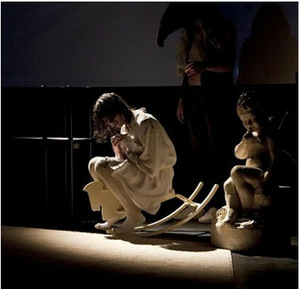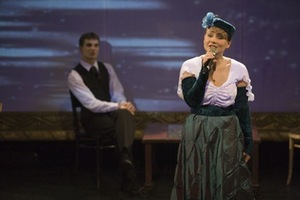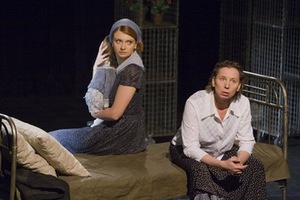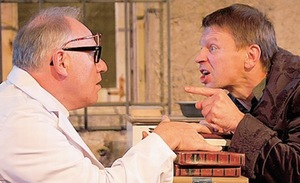NONCOMMITTAL IMPRESSIONS FROM THEATRE LIFE OF KAUNAS (I) 1
In brief: This text is dedicated to the theatrical life of Kaunas today: what kind of performances are shown, what kind of actors work, what latest passions and intrigues are, what kind of viewers visit theatre.
LOOKING AROUND KAUNAS STATE DRAMA THEATRE
Kaunas State Drama Theatre shows more than twenty performances a month. The major stage of the theatre has been reconstructed for a while now, so performances are shown in various chamber halls. Little rooms create the impression of a small theatre and its close relationship with viewers.
Cult of the Young Areima
Four repertoire performances by Artūras Areima are shown at the Drama Theatre. A young and productive director has his own audience, a postmodern, eclectic style and energy needed to blow up the sleeping theatre.
A. Areima’s ‘Robbers’ after the play of Friedrich Schiller is shown at Rūta Hall. The performance is based on the style of Quentin Tarantino. Scenography was created by the director himself: couches covered in cellophane, Rejected stamps on walls and WC door. Two subjects are developed – suffering of the young Franz (actor Saulius Čiučelis) rejected by his father and the rave of the elder brother Karl’s (actor Tomas Rinkūnas) gang.
Allusions to Hollywood films, clichés of pop culture, Tarantino-style musical inclusions, and citations of other directors appear in the play after ending up in Areima’s hands. Banal jokes of Karl’s gang, clownish gangsters and quite vulgar invasion into the audience (a drunken girl Kosinski picking up male viewers) create chaotic atmosphere. The disclosure of theatricality, when characters start to speak about the performance they play, is not surprising. The subject of Karl gang’s life already resembles of improvisation. The performance ends and the majority of viewers applause enthusiastically. However, the first encounter with Areima seems a rather tasteless spectacle, fulfilled with metaphors thus too swampy, yet very suitable to entertain.
The second performance ‘Marquise de Sade’ after the play of Yukio Mishima tells us about a woman who waited for her libertine husband to come back from prison for twelve years and left him the very day he came back.
A group of eccentric women play in the performance. The costume designer Diana Kuzmickaitė chose imitation of the Baroque and fetishist styles and created impressive body masks. Mme. de Montreuil, mother of Renee de Sade (actress Jūratė Onaitytė), represents norms of the decent society with her modest black dress and neat bun. Renee‘s sister Anne (actress Inga Mikutavičiūtė) is an infantile, inhumane beauty controlled by body lusts. Her authority is Countess de Saint-Fond (actress Daiva Stubraitė) who lost her head for passion. Baroness de Siamiane (actress Audronė Paškonytė) is pious and rumour-loving. The only woman without any mask is Renee (actress Inga Patkauskaitė) waiting and supporting her sadist husband de Sade.
The performance raises many questions about fate, free will, dark sides of personality. After the performance the same questions remain open.
Living Classics
The director Gytis Padegimas decided to revive the early-twentieth-century mystic and writer Juozapas Albinas Herbačiauskas in the performance ‘JAH’.
Clothes common in school performances were supposed to underline the colourfulness of two Herbačiauskas‘s personalities. There were little visual differences between the Lithuanian and Polish bohemia, which divided the life of the young Herbačiauskas (actor Mikalojus Urbonas) in Cracow and the career of the elder one (actor Sigitas Šidlauskas) in Lithuania.
Herbačiauskas’s tendency of summoning ghosts and those ghosts following the shaggy mystic did not look strong enough. Video projections were successful though. At first images of Herbačiauskas’s grave are shown, and later they become a means of communication with the dead. Giedrius Kuprevičius plays on stage, actors dance and sing – such notes of musical and cabaret create rhythm and echo the spree already passed. Herbačiauskas’s character is eccentric, full of mysticism and legends while portraits of famous Lithuanian and Polish intellectuals are also interesting. However, the performance did not come true and the play is mainly to blame.
The performance ‘Purge’ was directed by the director Jonas Jurašas after the novel of the Finnish writer Sofi Oksanen. The novel ought to be read before seeing the performance, since laconic details left by Jurašas are very imaginative and rich in the novel. Scenography by Julija Skuratova consists of metal cage, which represents the space of a village house full of various items and memory fragments.
The actress Eglė Mikulionytė (Allide Truu) should be hugely complimented for her masterly incarnation both of an old woman hiding terrible secrets and a young, pragmatic woman in love. Transformation is momentary – it only takes to sit on a chair and remove a coat. Ingel played by Gabrielė Aničaitė is too transformed by memory. The girl follows the reconstruction time of Allide’s confession and sins. Aliide’s niece, the prostitute Zara (actress Elzė Gudavičiūtė) tears the soul wounds of the old woman. The world full of evil, resembling of a prison, can only disappear by repenting. And the purge does happen.
The Star of Kazlas
‘The Ward’ directed, staged and played by Rolandas Kazlas was premiered three years ago but it is still a sell-out. The scenographer Neringa Keršulytė divided the Long Hall into two spaces – a corridor full of the healthy and those serving the system and a ward, in which the intellectual Gromov (actor Rolandas Kazlas) lies. The play was based upon two short stories by Anton Chekhov – ‘Ward No. 6’ and ‘The Black Monk’.
The subject is rather simple: doctor Ragin (actor Liubomiras Laucevičius) visits his patient Gromov and is glad to find an intelligent person who is capable of speaking about books and philosophy. Ragin tries to tame his patient. Finally, he dares to rise above the banal crowd and is placed in the same ward with Gromov.
The performance presents a drama of two intelligent individuals and examines the tiny line between the genius and the insane. At night Gromov is visited by his figment of imagination - the Black Monk (actor Dainius Svobonas) and in the daytime – by indifferent hospital attendants devoted to a perfect system. Gentle but shy and silent nurse (actress Raimonda Šukytė), strict and cheeky young doctor (actor Arūnas Sužiedėlis) and warden Nikita (actor Artūras Slanionis) are the mass of the sane, which get to decide who is suitable to belong to society.













